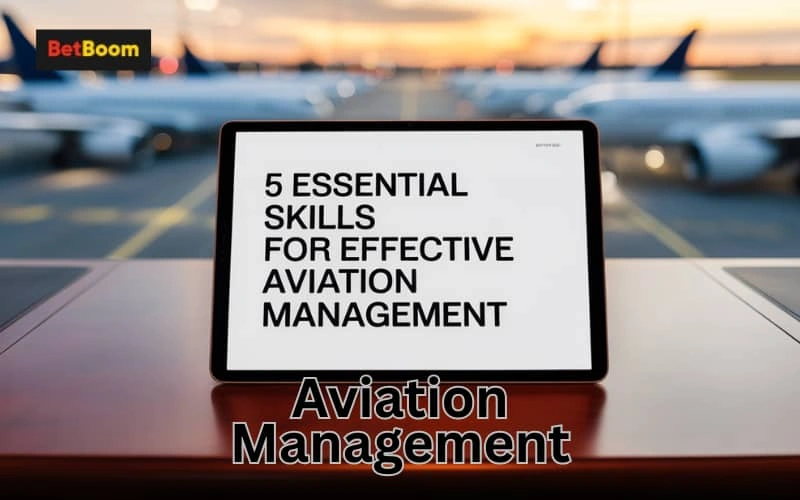Aviation management is a dynamic and high-stakes field that requires a unique combination of technical expertise, leadership ability, and strategic thinking. Professionals working in this area are responsible for overseeing the day-to-day operations of airlines, airports, and bet boom other aviation-related organizations. As global travel continues to grow, the demand for skilled aviation management professionals becomes even more critical. To succeed in this industry, it is essential to develop and master a specific set of skills that are vital for effective aviation management.
Leadership and Team Management
One of the most crucial skills in aviation management is leadership. A successful aviation manager must be able to lead a diverse team of professionals including pilots, ground staff, air traffic controllers, and administrative personnel. Effective leadership in aviation management involves setting clear goals, providing consistent guidance, and motivating employees to perform at their best. It also requires the ability to make quick decisions under pressure and to resolve conflicts in a manner that maintains harmony and efficiency within the team. Strong leadership ensures that all departments function cohesively and align with the organization’s objectives.
In aviation management, team management also plays a significant role. Coordinating different departments and ensuring that everyone understands their responsibilities is key to maintaining smooth operations. A good aviation manager fosters open communication and collaboration among departments, making sure that information flows freely and accurately.
Strategic Planning and Decision-Making
Strategic planning is at the heart of aviation management. It involves forecasting, budgeting, and making decisions that align with long-term goals. Aviation managers must analyze market trends, evaluate new technologies, and make informed choices that will contribute to the growth and profitability of their organization. Effective decision-making in aviation management requires not only analytical skills but also a deep understanding of how various aspects of the industry interact.
The aviation sector is influenced by many variables such as fuel prices, government regulations, technological advancements, and passenger preferences. A skilled aviation manager can anticipate these changes and develop contingency plans. Strategic thinking also helps in resource allocation, route planning, and fleet management. By focusing on long-term objectives while managing current challenges, aviation managers can steer their organizations toward success.
Communication and Interpersonal Skills
Another essential skill in aviation management is effective communication. Aviation managers must regularly interact with a wide range of stakeholders, including staff members, passengers, regulatory bodies, and business partners. Clear and concise communication ensures that expectations are understood and that instructions are followed accurately. Miscommunication in aviation can lead to significant delays or even safety risks, making this skill extremely important.
Interpersonal skills are also vital for aviation management. Building positive relationships with team members and external partners fosters a productive work environment. Aviation managers must be approachable, empathetic, and able to listen to others. Good communication and interpersonal skills help to resolve misunderstandings and prevent conflicts from escalating.
Financial and Resource Management
In aviation management, financial literacy and resource management are indispensable. Aviation managers are responsible for budgeting, controlling costs, and maximizing the use of available resources. They must understand how to manage finances in a way that supports operational goals while ensuring profitability. This includes tasks such as negotiating contracts, managing vendor relationships, and analyzing financial reports.
Effective resource management also involves making the most out of physical assets like aircraft, hangars, and ground equipment. Aviation managers must schedule maintenance, plan equipment purchases, and optimize fleet utilization. By efficiently managing both financial and physical resources, aviation managers contribute to the overall sustainability and competitiveness of their organization.

Regulatory Compliance and Safety Management
Aviation is one of the most heavily regulated industries in the world. Therefore, knowledge of regulatory compliance and safety standards is essential in aviation management. Managers must ensure that their operations comply with international, national, and local aviation laws. This includes adhering to standards set by organizations like the International Civil Aviation Organization and local aviation authorities.
Safety is a top priority in aviation management. Aviation managers must develop and implement safety management systems that identify risks and reduce the likelihood of accidents. They need to oversee training programs, conduct safety audits, and ensure that all employees follow proper procedures. Staying updated with regulatory changes and maintaining high safety standards helps to build trust with passengers and stakeholders.
Conclusion
Aviation management is a challenging yet rewarding career that demands a multifaceted skill set. By developing strong leadership and team management capabilities, aviation professionals can guide their teams effectively. Strategic planning and sound decision-making enable them to steer their organizations through complex challenges. Communication and interpersonal skills foster collaboration and clarity. Financial and resource management ensure sustainability and growth. Finally, regulatory compliance and a strong focus on safety preserve the integrity of aviation operations.
Mastering these five essential skills is critical for anyone seeking a successful career in aviation management. With the right combination of knowledge, experience, and soft skills, professionals in this field can contribute to the continued evolution and safety of the global aviation industry.






